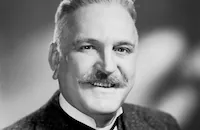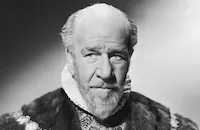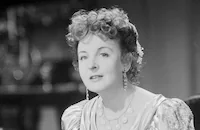The Perfect Gentleman

Brief Synopsis
Cast & Crew
Tim Whelan
Frank Morgan
Cicely Courtneidge
Heather Angel
Herbert Mundin
Una O'connor
Film Details
Technical Specs

Synopsis
English aristocrat Major Horatio Chatteris, deep in debt and considered by his sister Harriet and son John to be a dissolute squanderer, decides to leave his home and return a reformed man, so that they can be proud of him. The dejected major is blamed for harming John's chances of being appointed to the prosperous parish of Upper Haddington by the Bishop because of his poor reputation, an appointment that John needed in order to pay back money borrowed to settle some of his father's debt. After promising to pay John back when he returns, the major sets out for London on a train, where he meets singer April Maye, who is going to perform at a London music hall for the first time in her life. April tells the major that she must be a great success or else she will become destitute, and the major, sympathetic to her plight, offers to attend her performance to cheer her on. When April gives a terrible performance, however, and the audience gives her the "razz," the major, appalled by the heckling, upbraids the audience and then joins her on the stage to revive her act. The pair become an instant hit after bringing the house down with their rendition of "Pack Up Your Troubles." The major, who has been made a celebrity after giving his story to a London newspaper, is recognized by bill collector Hitch during one of their performances and is pursued by him for the £47 he owes him. Hitch catches up with the major at a restaurant and coerces him into writing a bad check, thus putting him in jeopardy of going to prison. April manages to prevent disaster by outwitting Hitch and retrieving the check while doing the rumba with him on the dance floor before he leaves for the bank. At April's suggestion, the major agrees to join her act so that he can make enough money to pay his debt. After completing their first London stint, the major takes April to meet his family, where they attend a society auction to raise money for the parish. When the two decide to take over the auction and invigorate it, the scene quickly turns to bedlam, leaving them at odds with Harriet and the others. The major pays John back the money he promised him, but decides to stop touring with April when he overhears a booking agent request that she perform in a West End revue without him. April, who has fallen in love with the major, is heartbroken when he insists that they split. Once again, the major is forced to leave home when Harriet and the Bishop complain about his unseemly association with theater people. Evelyn, John's softhearted fiancée, refuses to accept the major's exile, convinces John of his sacrifices for them and then goes to find him in London. The major turns up at one of April's performances, where he meets her in her dressing room to ask her if her earlier offer of marriage stills stands. The reunited couple become engaged and win the respect of Evelyn and John.

Director
Tim Whelan
Cast

Frank Morgan
Cicely Courtneidge

Heather Angel

Herbert Mundin

Una O'connor

Richard Waring

Henry Stephenson
Forrester Harvey
Mary Forbes

Doris Lloyd
Edward Cooper
Brenda Forbes
Clifford Severn

Ivan F. Simpson
William Stack
Lilyan Irene
Allan Conrad
Eva Dennison
Robert Bolder
Olaf Hytten
Charles Coleman
John Rogers
Clyde Cook
Cyril Thornton
Val Stanton
Helena Phillips Evans
Ann Douglas
Barlowe Borland
David Clyde
Stuart Casey
Cosmo Kyrle Bellew
Eric Wilton
Yorke Sherwood
Sonny Ray

Leonard Mudie
May Beatty
Harry Allen
Neil Fitzgerald
Joseph R. Tozer
Leyland Hodgson
Dave Marx
Tim Whelan
Milton Owen
Crew
Harold Adamson
Fred E. Ahlert
George Asaf
Dr. William Axt
George Boemler
Edward Childs Carpenter
Charles [g.] Clarke
Cedric Gibbons
Leon Gordon
Dave Gould
Eddie Imazu
Walter Jurmann
Bronislau Kaper
Burton Lane
Lew Lipton
Felix Powell
Harry Rapf
Carl Roup
Douglas Shearer
Dolly Tree
Ned Washington
Edwin B. Willis
Joe Young

Film Details
Technical Specs

Articles
The Perfect Gentleman -
By Frank Miller

The Perfect Gentleman -
Quotes
Trivia
Notes
According to an M-G-M pressbook for this film, Edward Childs Carpenter adapted Cosmo Hamilton's short story as a stage vehicle for Frank Morgan, but the play was never produced. Studio records also indicate that Dave Marx, a former M-G-M property boy, played a small role in this film, as did director Tim Whelan. Whelan took over the part of an usher when he decided to re-shoot a scene after the original player was released. This film marked the American screen debuts of stage actor Richard Waring and actress Cicely Courtneidge, who was borrowed by M-G-M from British-Gaumont in exchange for Madge Evans and Jean Parker. As noted in this film's publicity material, a special set was constructed at M-G-M for the scene in the London music hall where alternating shots of Courtneidge's failing stage performance and the audience's reaction in the gallery were required. The gallery was built on an elevator that could be raised for the theater shots and lowered for other shots, thus allowing the camera to remain fixed at one postion. The balloon dance routine, which featured thirty-six dancers and was rehearsed at the Biltmore Theatre in Los Angeles, proved to be a troublesome affair when the balloons began popping during the rehearsal of the number. The problem was apparently solved by trimming the dancers' fingernails. A Hollywood Reporter production chart refers to this film as A Perfect Gentleman and incorrectly lists actor Richard Waring as Robert Waring. Other Hollywood Reporter production charts list actors Robin Adair, Earle Hodgins, Claude King, Oscar Radin, Elsa Buchanan and Harry Stubbs in the cast, but their appearance in the released film has not been confirmed. Hollywood Reporter pre-release news items list actors Robert Cory, Ottola Nesmith and Gyles Isham in the cast, but their appearance in the final film has also not been confirmed. According to Hollywood Reporter pre-release news items, following a sneak preview in which a trial ending was used, M-G-M decided to shoot another week on the picture and give it a new ending. For this, M-G-M assigned writers Lew Lipton and Leon Gordon to write new comedy sequences. This film was released in Great Britain as The Imperfect Lady.















